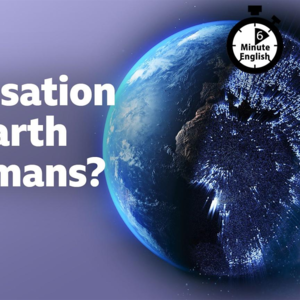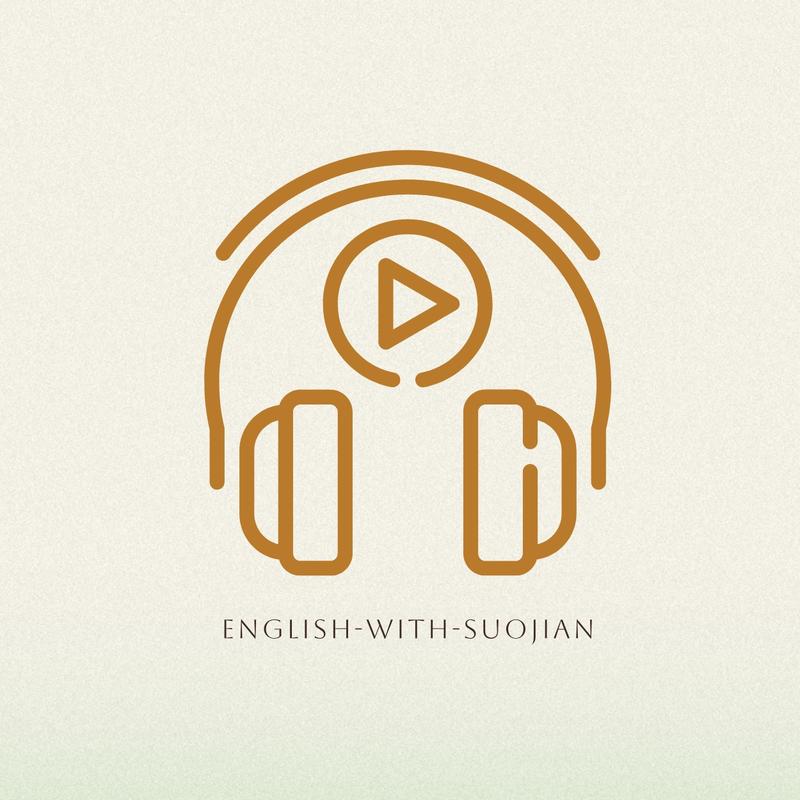
时长:
5分钟
播放:
2,207
发布:
3个月前
主播...
简介...
Did a civilisation exist on Earth before humans?
Beth
Hello, this is 6 Minute English from BBC Learning English. I'm Beth.
Phil
And I'm Phil.
Beth
Phil, do you believe there's life on other planets?
Phil
Well, there's a lot of other planets, so yeah, I think there must be.
Beth
Yeah, I agree. Well, it's a question that interests American astrophysicist Adam Frank, who discussed it with his colleague Gavin Schmidt, director of NASA's Institute for Space Studies. Here, Adam recalls their conversation for BBC World Service programme CrowdScience:
Adam Frank
We know that there's been no other civilisation on Earth, and he stopped me and said, "How do you know that?" And my jaw just dropped down to the floor.
Phil
Adam's jaw dropped – an idiom for when someone looks shocked and surprised. Could there have been a technologically advanced civilisation before us, here on Earth?
Beth
It may sound weird but this idea has a scientific name. Here is Caroline Steel, presenter of BBC's CrowdScience, to explain:
Caroline Steel
The Silurian hypothesis proposes that if there was a technologically advanced civilisation hundreds of millions of years ago, we wouldn't be able to find traces of it.
Phil
A hypothesis is an idea which explains how something happens and can be tested to find out if it's correct. In this episode, we'll be discussing the Silurian hypothesis: the idea that a technologically advanced civilisation existed before us on Earth but vanished without leaving a trace.
Beth
But first, I have a question for you, Phil. Human civilisation is thousands of years old but the planet itself is much older. So, how old do scientists think the Earth is? Is it: a) 3.5 billion years, b) 4.5 billion years, or c) 5.5 billion years?
Phil
I'm going to guess c) 5.5 billion years.
Beth
OK. Well, we will find the answer out later in the programme. To believe a technologically advanced civilisation existed on Earth hundreds of millions of years ago, most people would probably want evidence. We have evidence about other species from the past, such as the dinosaurs, from fossils – the remains of prehistoric plants or animals that have been preserved in rock for a very long time.
Phil
But according to Adam Frank, fossils won't help prove the Silurian hypothesis, as he explains here to BBC World Service programme, CrowdScience:
Adam Frank
Most things are not fossilised. It's only a tiny fraction of Earth's life that has ever become fossilised. So, imagine that you have a 10,000-year-long civilisation, which is a blink of the eye for geology – that's too short to really create a lot of fossils.
Beth
Adam argues that only a tiny fraction – meaning a very small amount – of life on Earth has turned into fossil.
Phil
In geological time, even a 10,000-year-old civilisation is the blink of an eye – an idiom meaning a very short period of time. In other words, older civilisations might have existed on Earth but not for long enough to leave fossilised evidence.
Beth
However, not everyone is convinced by Adam's ideas. Evidence of our own civilisation, including plastics and man-made materials like concrete, is already being layered into the Earth's crust, and these are going to last a very long time. So, surely a technologically advanced civilisation from prehistory would have left similar marks.
Phil
Well, here's Adam Frank again, answering these objections on BBC World Service programme, CrowdScience:
Adam Frank
What happens is somebody else will pick up on their work, either affirming it and showing new evidence for it or pushing back on it, and once you get to, like, 20, 30 or 40 papers, then you have a consensus. You're like, "OK. We've really, really looked at this and now we know."
Beth
Adam welcomes new evidence, even evidence which contradicts his ideas, as part of the scientific method needed to prove a hypothesis right or wrong. It's how scientists form a consensus – meaning a general agreement – about the issue.
Phil
Personally, I think the idea of prehistoric civilisations on Earth is so mysterious, it's OK to keep an open mind. Now, isn't it time you revealed the answer to your question, Beth?
Beth
I think it is. I asked you, "How old do scientists think the Earth is?" You said, "5.5 billion years," and I'm afraid you were wrong, Phil. It's 4.5 billion years.
OK. Let's recap the vocabulary we've learnt, starting with the idiom my jaw dropped, which is used to say someone looks very shocked and surprised.
Phil
A hypothesis is a suggestion that's proposed to explain something, which can then be tested to see if it's true.
Beth
Fossils are the remains of prehistoric plants or animals that have been preserved in rock for a very long time.
Phil
A tiny fraction of something is a very small amount of it.
Beth
The idiom the blink of an eye means a very short period of time.
Phil
And finally, a consensus is a general agreement.
📝字数限制,词汇表、翻译及pdf见公众号【琐简英语】,回复1可加入【打卡交流群】
Beth
Hello, this is 6 Minute English from BBC Learning English. I'm Beth.
Phil
And I'm Phil.
Beth
Phil, do you believe there's life on other planets?
Phil
Well, there's a lot of other planets, so yeah, I think there must be.
Beth
Yeah, I agree. Well, it's a question that interests American astrophysicist Adam Frank, who discussed it with his colleague Gavin Schmidt, director of NASA's Institute for Space Studies. Here, Adam recalls their conversation for BBC World Service programme CrowdScience:
Adam Frank
We know that there's been no other civilisation on Earth, and he stopped me and said, "How do you know that?" And my jaw just dropped down to the floor.
Phil
Adam's jaw dropped – an idiom for when someone looks shocked and surprised. Could there have been a technologically advanced civilisation before us, here on Earth?
Beth
It may sound weird but this idea has a scientific name. Here is Caroline Steel, presenter of BBC's CrowdScience, to explain:
Caroline Steel
The Silurian hypothesis proposes that if there was a technologically advanced civilisation hundreds of millions of years ago, we wouldn't be able to find traces of it.
Phil
A hypothesis is an idea which explains how something happens and can be tested to find out if it's correct. In this episode, we'll be discussing the Silurian hypothesis: the idea that a technologically advanced civilisation existed before us on Earth but vanished without leaving a trace.
Beth
But first, I have a question for you, Phil. Human civilisation is thousands of years old but the planet itself is much older. So, how old do scientists think the Earth is? Is it: a) 3.5 billion years, b) 4.5 billion years, or c) 5.5 billion years?
Phil
I'm going to guess c) 5.5 billion years.
Beth
OK. Well, we will find the answer out later in the programme. To believe a technologically advanced civilisation existed on Earth hundreds of millions of years ago, most people would probably want evidence. We have evidence about other species from the past, such as the dinosaurs, from fossils – the remains of prehistoric plants or animals that have been preserved in rock for a very long time.
Phil
But according to Adam Frank, fossils won't help prove the Silurian hypothesis, as he explains here to BBC World Service programme, CrowdScience:
Adam Frank
Most things are not fossilised. It's only a tiny fraction of Earth's life that has ever become fossilised. So, imagine that you have a 10,000-year-long civilisation, which is a blink of the eye for geology – that's too short to really create a lot of fossils.
Beth
Adam argues that only a tiny fraction – meaning a very small amount – of life on Earth has turned into fossil.
Phil
In geological time, even a 10,000-year-old civilisation is the blink of an eye – an idiom meaning a very short period of time. In other words, older civilisations might have existed on Earth but not for long enough to leave fossilised evidence.
Beth
However, not everyone is convinced by Adam's ideas. Evidence of our own civilisation, including plastics and man-made materials like concrete, is already being layered into the Earth's crust, and these are going to last a very long time. So, surely a technologically advanced civilisation from prehistory would have left similar marks.
Phil
Well, here's Adam Frank again, answering these objections on BBC World Service programme, CrowdScience:
Adam Frank
What happens is somebody else will pick up on their work, either affirming it and showing new evidence for it or pushing back on it, and once you get to, like, 20, 30 or 40 papers, then you have a consensus. You're like, "OK. We've really, really looked at this and now we know."
Beth
Adam welcomes new evidence, even evidence which contradicts his ideas, as part of the scientific method needed to prove a hypothesis right or wrong. It's how scientists form a consensus – meaning a general agreement – about the issue.
Phil
Personally, I think the idea of prehistoric civilisations on Earth is so mysterious, it's OK to keep an open mind. Now, isn't it time you revealed the answer to your question, Beth?
Beth
I think it is. I asked you, "How old do scientists think the Earth is?" You said, "5.5 billion years," and I'm afraid you were wrong, Phil. It's 4.5 billion years.
OK. Let's recap the vocabulary we've learnt, starting with the idiom my jaw dropped, which is used to say someone looks very shocked and surprised.
Phil
A hypothesis is a suggestion that's proposed to explain something, which can then be tested to see if it's true.
Beth
Fossils are the remains of prehistoric plants or animals that have been preserved in rock for a very long time.
Phil
A tiny fraction of something is a very small amount of it.
Beth
The idiom the blink of an eye means a very short period of time.
Phil
And finally, a consensus is a general agreement.
📝字数限制,词汇表、翻译及pdf见公众号【琐简英语】,回复1可加入【打卡交流群】
评价...
空空如也
小宇宙热门评论...
暂无小宇宙热门评论

